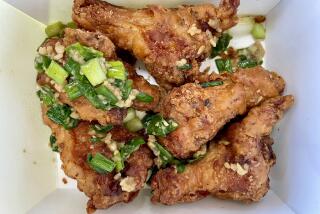110 Eateries in Tianjin Building : Chinese Port City Boasts New Haven for Gourmets
- Share via
TIANJIN, China — Since nothing could be finer than to eat a meal in China, delicacy-loving Chinese have been flocking to a new “Food Street”--ever since the doors opened here and all those wonderful aromas began drifting out.
In this northern Chinese city formerly known to Westerners as Tientsin, would-be gourmets can test their palates on a variety of expensive cookery offered at a novel conglomerate of refined restaurants.
The 110 eateries opened Jan. 1, crammed into a blocky, prison-like building on Nanshi Street.
Tianjin, an industrial port 70 miles southeast of Peking that is approaching a population of 5 million, boasts century-old European buildings evoking a colonial past. It has long been famous for its local cuisine--particularly garlicky, meat-filled dumplings, steamed cornbread and other simple but tasty dishes.
So Food Street and the city’s culinary reputation blended nicely.
Just Fine, Thank You
And business is thriving. Or as one reserved restaurateur put it, sales are “up to expectations.”
Despite the traditional fame of China’s several cuisines, good eating has suffered during the 35 years of spartan, Communist rule. Now, however, the government is stressing the need for more restaurants and other consumer services.
Food Street is proof that a need exists. It is the first such combination venture of its kind in China and is unusual because it offers a variety of food at higher than normal prices.
The costly menus do not keep working-class Chinese from jamming Food Street’s restaurants, even though a goodly number of the customers are government officials.
Once a neighborhood of hutongs-- residential alleys and courtyards--the city government leveled several blocks to build Food Street. It resembles a high-walled brick jail with Chinese-style watchtowers.
“We designed it to look old and historic,” a city official said.
Garlic and Steak
The pungent garlic smell of dumplings and the sizzling scent of broiling steak permeate the air around Food Street.
Service comes with a smile and a certain flair. One bar dresses its staff in Chinese garb of the 1920s. Teahouse waitresses attired in ornate Ming Dynasty-style gowns serve Communist Party officials.
The Three-Haired Boy, a restaurant named after a character in a folk tale, caters only to children’s birthday parties. Bright and festive decor, including a live Christmas tree, bedeck the dining room. Children are treated to candle-lit cakes, cookies and beverages.
Manager Zhang Xiaohai sees nothing unusual about his year-round Christmas tree. “It’s just a festive symbol,” he said.
Unique in China, the birthday restaurant is not cheap. It charges 15 yuan, the equivalent of $5.25, for this feast of snacks. A Chinese urban worker makes about $30 a month.
More to Read
Eat your way across L.A.
Get our weekly Tasting Notes newsletter for reviews, news and more.
You may occasionally receive promotional content from the Los Angeles Times.










